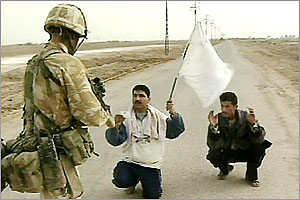In the heart of Imperial Amerika, where the rich-folks'-Constitution claims that freedom of speech is an inherent right, there are pro-war signs in Mississippi stating: "Support the US or keep your mouth shut."
Since Jak is from Canada perhaps he doesn't quite understand the purpose and structure of the U.S. Constitution but since this same type of idiocy is parroted by U.S. born and bred leftists let me take out the Cluebat and explain. The First Amendment of the Bill of Rights says
Congress shall make no law respecting an establishment of religion, or prohibiting the free exercise thereof; or abridging the freedom of speech, or of the press; or the right of the people peaceably to assemble, and to petition the government for a redress of grievances.
This like the other amendments in the Bill of Rights are a list of restrictions on what the government, specifically only the Federal government may do. Judicial thought in the last 100 years or so has moved toward a direction of full application of the Bill of Rights to the States also through the Due Process clause of the 14th Amendment:
Section 1. All persons born or naturalized in the United States, and subject to the jurisdiction thereof, are citizens of the United States and of the state wherein they reside. No state shall make or enforce any law which shall abridge the privileges or immunities of citizens of the United States; nor shall any state deprive any person of life, liberty, or property, without due process of law; nor deny to any person within its jurisdiction the equal protection of the laws.
Previously states were not considered bound by the Bill of Rights although most State constitutions had similar provisions. But the point is that these are limits on government action not on individuals. It does not prevent campuses from instituting speech codes (unless they are government run) nor does it prohibit employers from limiting what employees may say while on the job nor are calls to boycott the films of an actor with whom you disagree an assault on the First Amendment or the actors free speech rights. And it most certainly has nothing to do with a protesters sign telling other protesters to "shut up". He is just exercising his free speech rights.
That said, we live in an open and pluralistic society that values free speech and civil discourse and social pressures tend to keep even private attempts at limiting speech at bay. But that is not to imply that free speech is the right of people to say whatever they want without any consequence.





